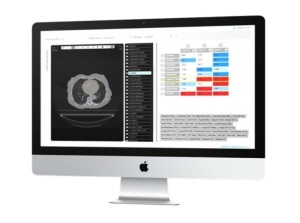por
John R. Fischer, Senior Reporter | March 23, 2018
Artificial intelligence for cancer care is headed to the Bay Area – specifically the University of California, San Francisco’s department of radiation oncology, to provide decision-making support for the treatment of head and neck, and lung cancers.
The Golden State institute has awarded a contract to software manufacturer, Siris Medical Inc., to install its QuickMatch solution to accelerate treatment planning and provide greater efficiency in choosing correct plans for individual patients.
“There is no formal metric for what an optimal radiotherapy treatment plan is, for what is possible for any individual patient,” Dr. Timothy Solberg, a professor and vice chairman of the division of medical physics in the department of radiation oncology, told HCB News. “QuickMatch allows us to capture the domain knowledge of our physicians, so we can prospectively understand what is possible for any specific patient, based on what has been achieved for similar patients in the past. The system continually learns from every new plan. Further, this can be augmented by data from other institutions, capturing additional domain knowledge, thus raising the bar for all practitioners.”
A radiation therapy treatment plan is devised from scratch and individualized for each patient in a process that takes one to two weeks to complete, thereby preventing treatment from taking place sooner.
QuickMatch software provides insight and easy-to-use data from historic patient cases at a facility to help its physicians understand what is possible with treatment and the trade-offs between therapy and potential side effects, removing timely and laborious treatment plan iterations involved in the planning process.
It also reduces dose to critical structures, compared to standard planning techniques, and offers improved dosimetric outcomes as well as potentially better coverage for planning tumor volume by lowering dose to organs at risk.
UCSF based its decision to implement QuickMatch on a study it participated in alongside Siris Medical, the University of Pennsylvania and the University of Maryland on the solution’s ability to utilize historical clinical insights for patient-specific decision-making.
QuickMatch, according to the results, was found to assist physicians, patients and payers alike in making better-informed decisions about treatment techniques, prescriptions and trade-offs.
“Value-based health care puts clinicians and institutions under great pressure to find more efficient, cost-effective ways to provide patients with high-quality health care,” Colin Carpenter, president and CEO of Siris Medical, told HCB News. “AI-powered technologies such as QuickMatch can efficiently and effectively empower clinicians to access relevant past data and consider predictions based on that data, so they can focus their clinical expertise on making the best possible decisions for each individual patient to achieve the best possible outcomes.”
UCSF recently
entered another agreement to use NantHealth’s GPS Cancer panomic molecular analysis test as part of a study to create a more efficient workflow that supports clinical decision-making for assessing metastatic breast cancer.
QuickMatch is designed for head and neck and lung cancers as well as prostate. It is part of InsightRT, a suite of software tools developed by Siris Medical, and is FDA cleared.
UCSF is currently in the midst of installing the software and expects it to be up and running for clinical use in approximately eight weeks, with plans to expand its use to additional disease sites, including prostate, over time.
